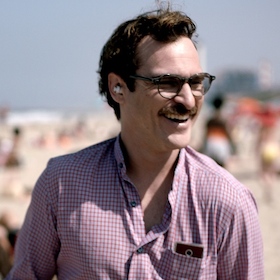'Her' Review: A Love Story Between More Than Just A Man And His Computer

4/5
Picture a movie about people finding the best in themselves. It also spreads a message of acceptance, unconditional friendship, and the way love betters a person. Got it in your head? Okay. Now what are the odds that those messages are conveyed in a film about a man falling in love with a sentient, but not human, operating system?
This is what makes writer/director Spike Jonze great. This is a vision that would have collapsed on itself in the hands of an amateur and yet, Her seamlessly weaves the very human experience with something that is not human at all, creating a stirring narrative that forces viewers to consider their feelings about some pretty heavy subjects. Theodore Twombly (Joaquin Phoenix), a professional letter-writer, is slowly dragging his feet through a long and painful divorce when the opportunity arises to buy an operating system that is more than just technology- it’s branded as “a consciousness.” The OS is not like what we’re currently used to: it’s not necessarily on a computer – it’s everywhere. And all you have to do is put one headphone in your ear to interact with your OS. Once Theodore purchases one, the OS comes to life and names herself Samantha (Scarlett Johansson), rapidly growing into a sentient being as she interacts more with Theodore. Though she is only alive because of him, she is not a product of her environment: she has her own sense of humor, her own morals, her own questions about everything. All of these traits just happen to enchant Theodore to the point of falling in love.
The movie provides a number of refreshing elements that make it original and engaging. First: Spike Jonze’s aesthetics have never been cleaner or more elegant. It’s futuristic without being heavy-handed (though the idea of a pedestrian-friendly Los Angeles is a pretty distant fantasy), blending elements of old and new. Hilariously, in this new age, dressing like an old man from the 1970s, complete with comb-over and creepy moustache, is back in style, lending a reliable, superficially absurdist value to the film (and will continue to do so until that fashion becomes a chilling reality). Tones of peach and orange are ever-present but not overwhelming, and lend to the futuristic dreamy feel of the film.
Second: it’s a film in which the A.I. (artificial intelligence) in question is benevolent as it becomes a sentient being, not some evil machine hell-bent on dominating humanity and destroying everything and everyone that stands in their way. That story is always intriguing, but it’s beginning to grow tired – plus, we all know 2001: A Space Odyssey did it best… and creepiest.
Third: Though the ending is a little heart breaking like the Pope is a little Catholic, it generally sends a positive and upbeat message about the future and its openness to love. Do people side-eye Theodore when he first admits to being in love with Samantha? A little – but not for nearly as long as you’d think. In a world plagued by stories of alienation, horror, and violence born out of confusion and intolerance for the way people choose to direct their love, it was uncharacteristically uplifting to see such hope for the evolution of society. Theodore and Samantha go on a double date with his co-worker and his girlfriend where they all discuss their differences over light-hearted conversation and generally enjoy each other’s company. He tells his best friend the same news and her reaction is immediately one of curiosity, asking questions, and obvious happiness over the fact that lonely, shy Theodore found a path to joy, however unconventional.
Scarlett Johansson as Samantha, the OS of Theodore’s eye, works perfectly. In a role where she is not even human (and you never see her), she seems more fluid, comfortable, and animated than in past movies where she didn’t quite hit the right notes to really grasp the character. The fact that Samantha never materializes as a human is crucial: it would make sense to find the movie a little lacking with one of its leads being visually absent, but for such a well-made movie to have such a cliché moment where Theodore’s dream woman shows up and all is right with the world – that would be a true shame. Instead, viewers are treated to her voice, brimming with curiosity and enthusiasm, and the effect is that it seems at all times like she’s just off-screen, standing behind the camera. (She wasn’t – that was just brilliant audio work.)
Joaquin Phoenix is fantastic as Theodore Twombly. He is able to perfectly articulate the wary loneliness of a person straight out of a crushing relationship, but he makes a believable, heartfelt, and genuine transition into an confident man, empowered by the love he has for Samantha (and the love that she undoubtedly returns, even if she is reading 184,000 pages of philosophy while they talk over breakfast). The warm chemistry between himself and his friend Amy (played by… uh… Amy Adams) keeps him from being written off as disconcertingly awkward (like, Lars and the Real Girl awkward) from the very beginning of the movie and continues to ground him in reality as he begins to spin away with Samantha.
Her could have been a cliché love story that just happened to be between a man and a machine, but Spike Jonze took that premise and filled it with positive and reaffirming messages, soothing visuals, and complex themes to make it anything but. The end result is a joyous, heartbreaking, original, and overwhelmingly human work that, much like love itself, is moving, intriguing, and powerful.
RELATED ARTICLES
Get the most-revealing celebrity conversations with the uInterview podcast!







Leave a comment